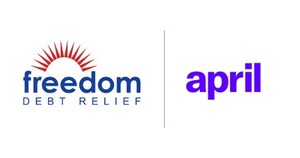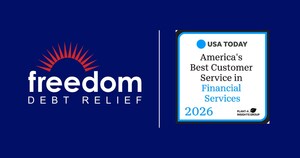
Freedom Debt Relief Suggests 7 Considerations Before Taking on Student Loan Debt
With total debt approaching $1.5 trillion, education borrowing takes real smarts
SAN MATEO, Calif., Nov. 29, 2017 /PRNewswire/ -- For would-be college students who are in the midst of financial aid applications, smart choices now can prevent excessive debt in the future, says Andrew Housser, co-founder and CEO of Freedom Debt Relief.
The first step for families and students applying for college is to complete the Free Application for Federal Student Aid (FAFSA). That form is available now for next school year. Students should apply as soon as possible. Because the FAFSA tells schools how much aid students qualify for, it is a vital part of planning college finance.
"Applying for financial aid – while important – is just the beginning of planning a strategy to minimize student loan debt," Housser says. "Student loans can be useful tools. But if you are unable to repay those loans, you may face unmanageable debt. That debt, in turn, could wind up seriously damaging your credit and ability to build a healthy financial future."
College graduates today owe a total of $1.45 trillion in student loans. To avoid starting life deep in the red, Freedom Debt Relief suggests these debt planning steps.
- Estimate costs before applying to colleges. Most colleges provide a cost estimator on their admission or financial aid website pages. Entering a few numbers about income and assets can tell families how much they can expect to pay.
- Seek out scholarships. Along with financial aid applications, look for other sources of assistance. It can take time to research and find the opportunities, but it will be well-spent time.
- Start at a two-year school. Many students find success by starting their higher education at a two-year institution and later transferring to a four-year school. Some students save even more by taking advantage of school district-funded tuition for community college classes.
- Decline credit cards. The average college graduate owes thousands of dollars in credit card debt. But high interest rates (often 15-30 percent) make this debt difficult to pay off. Instead of charging school-related expenses, take a part-time job, live at home or use loan funds for books and other costs.
- Know thyself. For some careers and some students, a college education is a must. "But before enrolling, think about your personal goals," the Freedom Debt Relief executive advises. "If you are unsure what you will study, or if you know you have difficulty completing programs, you might consider waiting a year or two before starting college." The experience gained from a job or internship can make college years more productive – and possibly help pay for them, too.
- Understand loan terms. Read the fine print on student loan paperwork. Understand payment obligations after graduation, and for people who cannot secure a job or experience other hardship. When looking at loans, know that federal student loans typically include many benefits not offered with private loans. Private loans are generally more expensive than federal student loans. Also keep in mind that most student loans must be repaid even if the borrower is struggling with debt. Student loans generally cannot be eliminated with debt relief programs.
"A college education can be an asset. Studies have shown that a college graduate may earn $1 million more than a high school graduate over their lifetime," Housser says. "But for those who borrow excessively, that education can lead to decades of debt."
Freedom Debt Relief
Co-founded by Andrew Housser and Brad Stroh, Freedom Debt Relief is a subsidiary of Freedom Financial Network, LLC, a family of companies providing innovative solutions that empower people to live healthier financial lives. For people struggling with debt, Freedom Debt Relief offers a custom program to significantly reduce and resolve what they owe more quickly than they could on their own. For more information about the company and its services, see www.freedomdebtrelief.com/faq.
Headquartered in San Mateo, California, Freedom Debt Relief also operates an office in Tempe, Arizona, and employs roughly 2,000 people. The company has been voted one of the best places to work in both the San Francisco Bay area and the Phoenix area for several years.
Contact: Aimee Bennett, Fagan Business Communications, 303-843-9840, [email protected]
SOURCE Freedom Debt Relief





Share this article